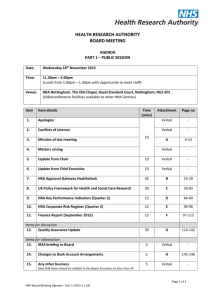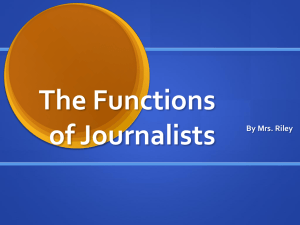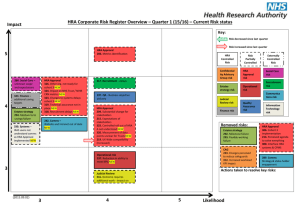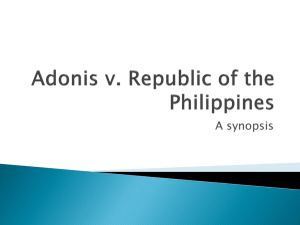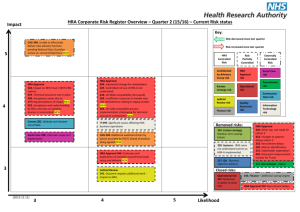Since 2007 Human Rights Action (HRA) has been advocating for
advertisement
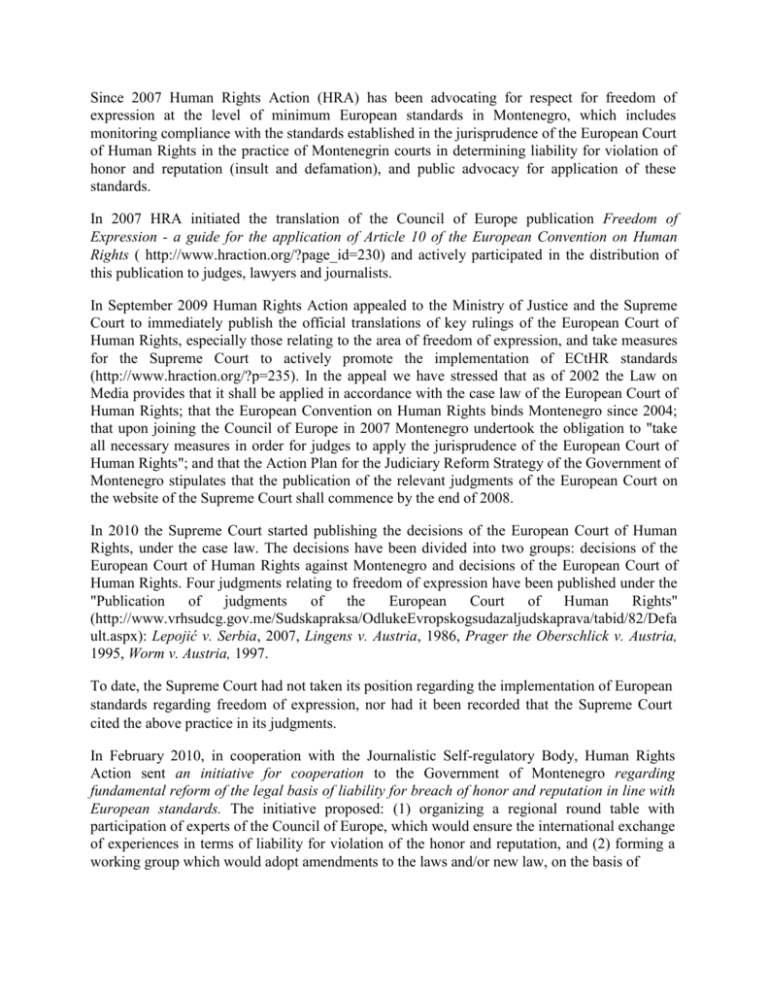
Since 2007 Human Rights Action (HRA) has been advocating for respect for freedom of expression at the level of minimum European standards in Montenegro, which includes monitoring compliance with the standards established in the jurisprudence of the European Court of Human Rights in the practice of Montenegrin courts in determining liability for violation of honor and reputation (insult and defamation), and public advocacy for application of these standards. In 2007 HRA initiated the translation of the Council of Europe publication Freedom of Expression - a guide for the application of Article 10 of the European Convention on Human Rights ( http://www.hraction.org/?page_id=230) and actively participated in the distribution of this publication to judges, lawyers and journalists. In September 2009 Human Rights Action appealed to the Ministry of Justice and the Supreme Court to immediately publish the official translations of key rulings of the European Court of Human Rights, especially those relating to the area of freedom of expression, and take measures for the Supreme Court to actively promote the implementation of ECtHR standards (http://www.hraction.org/?p=235). In the appeal we have stressed that as of 2002 the Law on Media provides that it shall be applied in accordance with the case law of the European Court of Human Rights; that the European Convention on Human Rights binds Montenegro since 2004; that upon joining the Council of Europe in 2007 Montenegro undertook the obligation to "take all necessary measures in order for judges to apply the jurisprudence of the European Court of Human Rights"; and that the Action Plan for the Judiciary Reform Strategy of the Government of Montenegro stipulates that the publication of the relevant judgments of the European Court on the website of the Supreme Court shall commence by the end of 2008. In 2010 the Supreme Court started publishing the decisions of the European Court of Human Rights, under the case law. The decisions have been divided into two groups: decisions of the European Court of Human Rights against Montenegro and decisions of the European Court of Human Rights. Four judgments relating to freedom of expression have been published under the "Publication of judgments of the European Court of Human Rights" (http://www.vrhsudcg.gov.me/Sudskapraksa/OdlukeEvropskogsudazaljudskaprava/tabid/82/Defa ult.aspx): Lepojić v. Serbia, 2007, Lingens v. Austria, 1986, Prager the Oberschlick v. Austria, 1995, Worm v. Austria, 1997. To date, the Supreme Court had not taken its position regarding the implementation of European standards regarding freedom of expression, nor had it been recorded that the Supreme Court cited the above practice in its judgments. In February 2010, in cooperation with the Journalistic Self-regulatory Body, Human Rights Action sent an initiative for cooperation to the Government of Montenegro regarding fundamental reform of the legal basis of liability for breach of honor and reputation in line with European standards. The initiative proposed: (1) organizing a regional round table with participation of experts of the Council of Europe, which would ensure the international exchange of experiences in terms of liability for violation of the honor and reputation, and (2) forming a working group which would adopt amendments to the laws and/or new law, on the basis of conclusions of the public debate, that will ensure the implementation of European standards in practice. As, unfortunately, we have not found a proper understanding of the Government, we organized a regional round table, satisfying all the criteria listed in the initiative, with the support of the Open Society Institute and the British Embassy in Podgorica, and we have also formed a working group, including an expert of the Council of Europe as an advisor, in order to prepare a draft reform. On 9 November 2010 the European Commission published its Opinion on Montenegro's application for membership of the European Union (http://ec.europa.eu/enlargement/pdf/key_documents/2010/package/mn_opinion_2010_en.pdf) which reads as follows: In terms of media freedom, intimidation of journalists and disproportionate penalties for defamation raise concern. Laws and practice in terms of determining liability for defamation must be fully compliant with the European Court of Human Rights case law. One week later, on 17 November 2010, HRA working group issued a Draft reform of the constitutional and legal provisions on liability for violation of the honor and reputation (http://www.hraction.org/?p=457). We have proposed amendments to: 1. Constitution of Montenegro (Articles 47 and 49); 2. Criminal Code, specifically: 2.1 Full decriminalization of Chapter XVII (criminal offences against honor and reputation) and, alternatively, 2.2 Amendments to the criminal offences provided for in this chapter; 2.3 Proposal of new criminal offenses "Preventing journalists in the performance of professional duties" (Article 179a) and "Attack on journalists in the performance of professional duties" (Article 179b); 3. Media Law (specifying due journalistic care; limiting amounts of non-pecuniary damages for breach of honor and reputation; privacy provisions and exemptions regarding privacy rights). Discussion of the proposal was held on 26 November. After the Minister of Justice, Dusko Markovic, announced decriminalization of defamation in December 2010, HRA welcomed this announcement, while insisting on the implementation of European standards in the field of civil liability for violation of the honor and reputation in Montenegro, as stated in the Proposal.1 Since the Government of Montenegro prepared the Draft Action Plan for monitoring implementation of recommendations from the opinion of the European Commission, in January 2011 HRA was intensively involved in public debates organized on this occasion, considering it necessary that in addition to the proposed decriminalization of insult and defamation, the Action Plan includes measures for further reform of liability for breach of honor and reputation in accordance with the proposal. Within the due deadline, we have developed and submitted to the Government the proposed amendments to the Action Plan for the area of media: In addition to planned amendments to the Criminal Code so as to further decriminalize defamation, we also proposed amendments to the Criminal Code by introducing two offences that would align the protection of journalists in performing their professional tasks with the protection enjoyed by officials in the performance of public services, as well as the amendments to the Media Law so as to ensure the introduction of European standards of freedom of expression in the field of civil liability for violation of the honor, reputation and privacy. Also, we suggested that the Supreme State Prosecutor is requested to prepare a report on the investigations undertaken on the occasion of physical violence against journalists, analyzes their results and specifies the measures for further processing.2 Within the 60% of fully adopted proposals to the Action Plan, we are particularly encouraged by the commitment to be responsible authorities to develop a report on investigations in cases of violence against journalists. We will continue to point out the necessity of adopting the proposal: 1) to introduce two new criminal offenses and thus equal protection of journalists and official entities, 2) to amend the law on media so as include the standards of the European Court of Human Rights jurisprudence, to make them easier and safer to apply for journalists and judges.3 In early April the Ministry of Justice announced the draft Law on Amendments to the Criminal Code.4 HRA responded immediately since the Ministry of Justice, in accordance with the explicit formulation of the Action Plan, in the draft version of the Draft Law on Amendments to the Criminal Code proposed deletion of criminal acts of Insult (Article 195) and Defamation (Article 196), so the Government, by adopting The Bill, gave up the complete decriminalization of the benefit of all, and suggested decriminalization only in favor of reporters and editors for content published in the media.5 Response was published in daily newspapers6, which was followed by 1 HRA press release available at: http://www.hraction.org/?p=520. HRA press release available at: http://www.hraction.org/wp-content/uploads/action-plan-press-releasefeb- 2011.pdf. Proposal of amendments available at: http://www.hraction.org/wpcontent/uploads/proposed- amendments-to-the-draft-action-plan.pdf. 3 Report on adoption of HRA proposals in the Government’s Action Plan for monitoring the implementation of the EC recommendations available at: http://www.hraction.org/?p=622. 4 Proposal available at: http://www.mpa.gov.me/biblioteka/predlozi-zakona. 2 5 6 HRA press release available at: http://www.hraction.org/?p=770. „Journalists overprotected now“, daily Vijesti, 4 April 2011 similar reactions and other non-governmental organizations7. HRA then organized all the relevant non-governmental organizations that opposed this proposal and on 13 April 2011 submitted to the Prime Minister Luksic a letter in favor of the decriminalization of insult and defamation, supported by 22 NGOs.8 Also, the letter in support of decriminalization was submitted to the parliamentary Committee for the political system, judiciary and administration. HRA executive director, Tea Gorjanc Prelevic, participated in the Committee’s session held on 27 April 2011 on behalf of all the signatories. On 9 April 2011 the Prime Minister stated that the complete decriminalization of defamation is one of the mechanisms for the promotion of media freedom where the European standards will be implemented better,9 while on 14 April 2011 the Government adopted the Ministry’s of Justice amendments to the Bill on Amendments to the Criminal Code, which provide complete decriminalization of defamation. As stated by the Minister of Justice, Dusko Markovic, the amendments followed the comments of experts, professional and amateur public.10 As a representative of one of the parties in the governing coalition, the Social Democratic Party (SDP) through the news agencies tried to misinform the public on proposed decriminalization of insult and defamation, and contrary to the announced reform, the Human Rights Action has once again responded. The reaction of 16 May 2011, with arguments, refuted claims that oppose the announced reforms.11 HRA has used organized meetings to present and submit its drafted proposal to foreign guests. Thus, for example, HRA executive director discussed the reform of liability for defamation and insult in a meeting with the Deputy Director of the Directorate-General for Enlargement of the European Union, Stefano Sannino, which was held on 10 February 2011 in the Parliament of Montenegro. The proposal was also discussed at the meeting held on 15 February 2011 between the Ambassador of the Kingdom of the Netherlands, Mr. Laurent Stokvis and HRA executive director, Tea Gorjanc Prelevic, and at the meeting with members of the European Parliament which took place on 17 May 2011. On 23 June 2011 the Parliament of Montenegro rendered the decision to delete the criminal acts of Defamation and Insult from the Criminal Code. HRA will continue to insist on further reform of the civil law (Media Law) in line with European standards. 7 Intimidating citizens with defamation“, daily Dan, 8 April 2011, „Lukšić supported decriminalisation of defamation“, daily Dan, 10 April 2011. 8 Letter in favor of decriminalisation of insult and defamation available at: http://www.hraction.org/wpcontent/uploads/U-PRILOG-DEKRIMINALIZACIJI-KLEVETE-I-UVREDE_eng.pdf. 9 “Prime Minister Igor Lukšić on Census and media freedom”, In TV, 9 April 2011 10 „Full decriminalisation of defamation“: http://www.portalanalitika.me/drutvo/vijesti/24470potpuna- dekriminalizacija-klevete-.html. 11 HRA reaction available at: http://www.hraction.org/?p=837. The Report on Human Rights in Montenegro 2010-201112 includes a special report on freedom of expression that contains legal analysis of legislation, its compliance with international standards and enforcement in practice, as well as the report on attacks on journalists, which is also available on the page dedicated to freedom of expression.13 Human Rights Action continues to draw public attention and condemn attacks on journalists. In this regard, in order to complete the Report concerning the prosecution of attacks on journalists and measures that the authorities have taken in this regard, HRA first submitted a letter to the Minister of Culture14, and later to the Prime Minister15, to draw their attention to the need for amending the Report on attacks the journalists, developed as a measure of the Action plan for monitoring the implementation of recommendations from the opinion of the European Commission. In January 2014 HRA published a report called Prosecution of attacks on journalists in Montenegro16, which, besides journalist attacks, also encompassed other instances of attacks and murders that happened in Montenegro in relation to the freedom of expression. The report was submitted to the members of at the time newly formed Commission for Monitoring the Actions of the Competent Authorities in the Investigation of Cases of Threats and Violence Against Journalists, Assassinations of Journalists and Attacks on Media Property. Nikola Markovic, the president of this Commission and deputy editor of newspapers Dan, stated that the Report would be very useful for Commission’s work and save much of their valuable time.17 On the HRA website there is a database of judgments relating to freedom of expression, as well as our commentary on some of the judgments. For easier reference, the judgments are separated into criminal and civil proceedings, as well as the judgments of the European Court of Human Rights, with HRA commentary below. 12 Report available at: http://www.hraction.org/wp-content/uploads/Ljudska_prava_u_Crnoj_Gori_2010-2011.pdf. 13 Report available at: http://www.hraction.org/?page_id=459. Letter to the Minister of Culture available at: http://www.hraction.org/?p=1351. 15 Letter to the Prime Minister available at: http://www.hraction.org/?p=1426. 14 16 Report “Prosecution of attacks on journalists in Montenegro”, available at: http://www.hraction.org/wpcontent/uploads/Izvjestaj-Procesuiranje-napada-na-novinare-u-Crnoj-Gori.pdf. 17 „Marković: “The Commission will resolve at least one journalist attack (Komisija će rasvijetliti makar jedan napad na novinare)“, Portal Cafe Del Montenegro, 31 January .2014, available at: http://www.cdm.me/drustvo/crna-gora/markovic-komisija-ce-rasvijetliti-makar-jedan-napad-na-novinare. HRA also implemented a project called Training for journalists in the field of human rights and freedoms and professional ethics that included workshops for editors and journalists on issues such as freedom of expression, protection of privacy, presumption of innocence and other important topics from the human rights area of high importance for successful conduct of journalist profession. Details about project. As a part of a project called Monitoring of journalistic self-regulatory bodies in Montenegro, HRA has been continuously observing reporting of the most influential media sources and selfregulatory bodies in Montenegro (including Media Self-Regulation Council, Self-Regulatory Local Press Council and Ombudsman from TV Vijesti and newspapers Vijesti, Dan and Monitor) for two years. As a result, HRA created four periodical reports on the results of monitoring of the self-regulatory bodies and the research on violation of ethical standards and the Codex of Montenegrin Journalists in the local media. Also, in cooperation with Peter Noorlander, attorney at law and director of Media Law Defence Initiative from London, HRA started publishing bimonthly bulletins on case law of the European Court of human rights with regard the freedom of expression. Continuous publication of the bulletins is part of the project Support for Understanding Journalistic Ethics and Freedom of Expression, initiated in October 2014 that will last until August 2015. The project also allowed creation of a web page, through which journalists and all other interested actors can inquire in relation to journalist ethics and the freedom of expression and receive an answer from the experts. Until the end of February, HRA will continue with implementation of its project Continuation of Debate on Applications of Code of Ethics of Montenegrin Journalists, where representatives of self-regulatory bodies will meet and discuss most important and controversial ethical issues. The main goal of this project is to improve professional cooperation and encourage relevant self-regulatory bodies to establish a consistent application of the Code.

